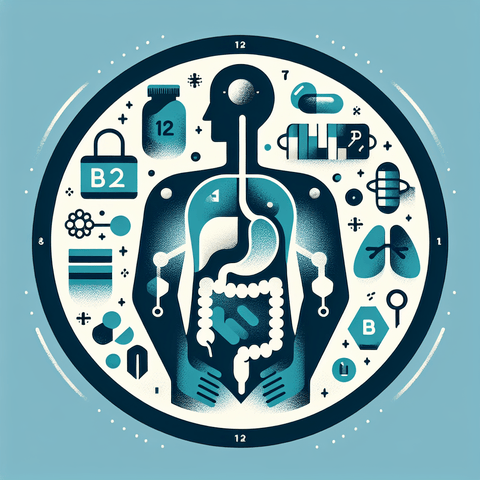Introduction
Vitamin B12, also known as cobalamin, is an essential nutrient that plays a vital role in maintaining overall health. It is crucial for DNA synthesis, red blood cell formation, neurological function, and energy production. Despite its importance, many individuals do not achieve optimal B12 levels through diet alone, especially those with specific health conditions or dietary preferences. With the rising popularity of B12 supplements, which are widely available in various forms such as tablets, sublingual drops, nasal sprays, and injections, it has become increasingly important to understand how to maximize their absorption and benefits.
This comprehensive guide aims to shed light on the complex process of B12 absorption, common pitfalls that can hinder its uptake, and proven strategies to enhance its bioavailability. Whether you're looking to boost your energy, support nerve health, or strengthen immunity, understanding the mechanisms behind B12 absorption will empower you to make informed choices about supplementation and lifestyle modifications. Let's explore how to unlock the secrets of B12 absorption and get the most out of your supplements for optimal health outcomes.
Understanding Vitamin B12 and Its Role in Nutritional Supplements
Vitamin B12, or cobalamin, is a water-soluble vitamin essential for numerous physiological processes. It serves as a cofactor in critical enzymatic reactions involved in DNA synthesis, fatty acid metabolism, and amino acid catabolism. Additionally, B12 is indispensable for the production of healthy red blood cells and proper neurological functioning, including nerve signal transmission and myelin sheath maintenance. Given these vital roles, adequate B12 levels are fundamental to overall health and wellness.
Dietary sources rich in B12 primarily include animal-based foods such as meat, eggs, dairy products, and shellfish. For individuals following plant-based diets or with limited access to animal products, achieving sufficient B12 intake through diet alone can be challenging. Consequently, many turn to dietary supplements to meet their needs, especially as deficiencies are linked to anemia, neurological issues, and cognitive decline.
In supplement form, vitamin B12 is available in several chemical forms: cyanocobalamin, hydroxocobalamin, methylcobalamin, and adenosylcobalamin, with methylcobalamin being considered the biologically active form. The choice of supplement depends on individual health status, absorption capacity, and specific health goals. However, factors such as age, gastrointestinal health, medications, and genetic predispositions can significantly influence B12 absorption and efficacy. Understanding these factors is key to optimizing supplement benefits and preventing deficiency.
B12 Absorption Tips: How to Improve Your Body’s Uptake of Vitamin B12
Maximizing B12 absorption involves understanding both dietary factors and supplement administration methods. The process of B12 uptake is complex, beginning in the stomach where it binds to a protein called intrinsic factor (IF), produced by parietal cells. The B12-IF complex then travels to the ileum (the last part of the small intestine), where specialized receptors absorb it into the bloodstream.
One of the most effective ways to improve B12 absorption is to consider the timing and method of intake. Oral B12 supplements, typically in tablet or capsule form, are generally effective for many people, particularly when taken on an empty stomach or with water. Sublingual forms—placed under the tongue—may bypass some gastrointestinal barriers, allowing for direct absorption through oral mucosa. For individuals with significant absorption issues, injections or nasal sprays can be highly effective, delivering B12 directly into the bloodstream or nasal mucosa, respectively.
Gut health plays a decisive role in B12 absorption. Conditions like atrophic gastritis, autoimmune disorders, or usage of medications such as proton pump inhibitors (PPIs) can impair stomach acid production, which is essential for releasing B12 from food. Reduced stomach acid hampers the initial step of B12 digestion, leading to lower absorption rates. Addressing gut health through dietary or medical interventions can significantly improve B12 uptake.
Managing lifestyle factors and medications that impair absorption is equally important. For example, excessive alcohol intake, certain antibiotics, and antacid medications can interfere with B12 absorption. Incorporating B12-rich foods and supplements into daily routines in conjunction with addressing these lifestyle factors ensures better utilization of available B12 stores. Proper timing, form selection, and gut health support are all integral strategies to maximize B12 benefits from supplements.
Methylcobalamin Benefits: Why This Active Form of B12 Might Be Your Best Choice
The form of vitamin B12 used in supplements significantly influences its bioavailability and efficacy. Methylcobalamin is the methylated, coenzyme form of B12 that is directly active in human metabolism. Unlike cyanocobalamin, which must be converted into active forms within the body, methylcobalamin is readily utilized by cells, especially in nerve tissue and the brain.
One of the primary advantages of methylcobalamin is its superior bioavailability, meaning it is more efficiently absorbed and incorporated into metabolic processes. This active form supports nerve regeneration, reduces neuropathic symptoms, and enhances cognitive function. It also benefits those with genetic polymorphisms affecting B12 conversion pathways, ensuring better utilization without requiring extensive conversion steps.
Research indicates that methylcobalamin offers particular benefits in nerve health, helping to repair damaged nerve sheaths and support myelin repair. Additionally, it may aid in reducing the symptoms of neurological disorders, such as peripheral neuropathy. Its role in energy production is also notable, as it helps facilitate methylation processes vital for overall metabolic health.
Long-term supplementation with methylcobalamin is often preferred because it avoids the need for conversion, providing a more direct and reliable source for those with impaired absorption pathways. Clinical studies further support methylcobalamin’s superiority over other forms, emphasizing its benefits in neurological health and overall B12 status. For individuals seeking an optimal B12 supplement option, considering methylcobalamin is a logical choice.
To explore high-quality methylcobalamin supplements, visit Topvitamine’s B12 collection.
Intrinsic Factor Role: Understanding Its Essential Function in B12 Absorption
Intrinsic factor (IF) is a glycoprotein produced by the parietal cells lining the stomach. Its primary role is to bind to dietary B12 and form a complex that can be absorbed efficiently in the ileum. Without intrinsic factor, the absorption of B12 severely diminishes, leading to deficiencies over time. This process is highly specific; the B12-IF complex binds to receptors on the ileal enterocytes, facilitating endocytosis and entry into circulation.
Problems with intrinsic factor production are common in autoimmune conditions like pernicious anemia, where the immune system attacks the parietal cells, impairing IF secretion. Other causes include gastric surgeries, atrophic gastritis, or certain genetic mutations affecting IF production. When intrinsic factor is deficient, oral B12 supplements may not be effectively absorbed, necessitating alternative approaches such as intramuscular injections or high-dose nasal sprays.
Supporting or bypassing intrinsic factor deficiencies requires strategic planning. Bypassing the need for IF via sublingual, injectable, or nasal B12 forms ensures adequate levels are maintained. Regular blood testing helps monitor B12 status and guides appropriate supplementation strategies. Recognizing and diagnosing intrinsic factor-related issues early is critical in preventing long-term neurological and hematological complications.
If you suspect intrinsic factor deficiency, consult with healthcare professionals to determine the best course of action. Supplementing with methylcobalamin or hydroxocobalamin through injections can restore B12 levels effectively when oral absorption via intrinsic factor is compromised.
B12 Deficiency Prevention: Key Strategies to Maintain Adequate Levels
Preventing B12 deficiency involves proactive measures, especially for at-risk populations such as vegans, vegetarians, older adults, individuals with certain medical conditions (e.g., gastrointestinal disorders), and those on restrictive diets or medications affecting absorption. The recommended daily intake of B12 varies by age, sex, and health status, generally around 2.4 micrograms for adults, with higher needs during pregnancy and lactation.
Regular testing is essential for maintaining optimal B12 levels, particularly for those with risk factors. Blood serum levels, methylmalonic acid (MMA), and homocysteine are common markers used to assess B12 status. Early detection of deficiency signs — such as fatigue, weakness, neurological disturbances, or anemia — can allow for timely intervention and prevent irreversible damage.
Combining a well-balanced diet rich in B12-containing foods with appropriate supplementation and lifestyle modifications offers a comprehensive approach. For example, incorporating B12-rich foods alongside high-quality supplements—such as methylcobalamin or hydroxocobalamin—can reinforce B12 stores. Addressing factors like gut health, managing medications, and avoiding alcohol excess further support B12 status.
Educating yourself about early deficiency signs is vital. These include numbness or tingling in extremities, memory issues, mood changes, or anemia. Addressing any deficiency swiftly with targeted supplementation can restore optimal levels and support overall health.
Supplement Absorption Enhancement: Tips to Get the Most from Your B12 Supplements
To enhance B12 absorption efficiency, choosing high-quality supplements formulated for maximum bioavailability is essential. Look for products that provide methylcobalamin or hydroxocobalamin, as these forms are more readily utilized by the body. Ensuring proper formulation, such as sublingual tablets, nasal sprays, or injectable options, can significantly improve absorption, especially in cases of gastrointestinal impairment.
Complementary nutrients such as folate, iron, and vitamin K play synergistic roles in supporting B12 function and absorption. For instance, maintaining adequate folate levels is vital for B12-dependent DNA synthesis. For this reason, consider an integrated approach by selecting supplements that include these supportive vitamins, like [Vitamin C for immune support](https://www.topvitamine.com/collections/vitamin-c-benefits-immunity-antioxidant-energy) or [Vitamin D to enhance overall metabolic health](https://www.topvitamine.com/collections/vitamin-d-benefits-sources-safety).
Careful timing of supplement intake can also aid absorption. Taking B12 on an empty stomach or at least one hour before meals allows for better uptake. If using sublingual formulas, placing the tablet or drops under the tongue and allowing them to dissolve completely facilitates absorption through the mucosa. For better bioavailability, some individuals prefer nasal sprays or injections, which bypass gastrointestinal barriers entirely.
It is equally important to avoid medications or substances that hinder absorption. Proton pump inhibitors and antacids, while necessary for certain conditions, can decrease stomach acid production and impair B12 release from food. Excessive alcohol consumption, smoking, and certain dietary habits can also interfere with absorption. Regular monitoring of B12 levels, adjusting supplement protocols accordingly, and working with healthcare providers will help maintain optimal B12 status over time.
Conclusion
Unlocking the full benefits of vitamin B12 supplementation requires a comprehensive understanding of its absorption pathways and influencing factors. From choosing the right form—such as methylcobalamin—to supporting gut health and intrinsic factor production, each step plays a critical role in ensuring effective uptake. Tailoring strategies based on individual health status, lifestyle, and medical history maximizes the potential for improved energy, nerve health, and immunity.
Personalized approaches, combined with professional guidance and regular testing, can prevent deficiency and foster overall well-being. Remember, proactive management is key. Incorporate B12-rich foods, select appropriate supplement forms, and pay attention to lifestyle factors that influence absorption. Take control of your health today by implementing these proven strategies for optimal B12 utilization.
For a curated selection of trusted supplements, visit Topvitamine.com. Your journey to better health starts with informed choices—maximize your B12 benefits now!
Q&A Section
Q1: What is the most effective form of B12 supplement for absorption?
A: The methylcobalamin form is considered the most bioavailable and effective for absorption, as it is the active form directly used by the body. It bypasses the need for conversion, making it especially suitable for individuals with absorption issues.
A: If you have low stomach acid, options include taking B12 in sublingual, nasal spray, or injectable forms. These methods bypass the need for stomach acid to release B12 from food, ensuring better absorption.
Q3: Are there dietary strategies to support B12 absorption?
A: Yes, consuming B12-rich foods alongside supplements, maintaining gut health, and avoiding medications like PPIs that reduce stomach acid can support absorption. Combining dietary sources with proper supplementation optimizes B12 levels.
Q4: How often should I test my B12 levels?
A: Regular testing is recommended annually or as advised by your healthcare provider, especially if you are in a risk group or taking medications that affect absorption. Monitoring helps tailor supplementation and prevent deficiencies.
Q5: Can taking supplements help prevent B12 deficiency in vegans or older adults?
A: Absolutely. For vegans or older adults, supplementing with methylcobalamin or hydroxocobalamin ensures adequate B12 levels, especially when dietary intake is limited. Regular testing and personalized strategies enhance effectiveness.
Important Keywords
- Vitamin B12 absorption
- Methylcobalamin
- B12 deficiency prevention
- Intrinsic factor
- B12 supplements
- Gut health and B12
- Best B12 forms
- B12 absorption tips
- Vitamin B12 for nerve health
- B12 deficiency risk groups



